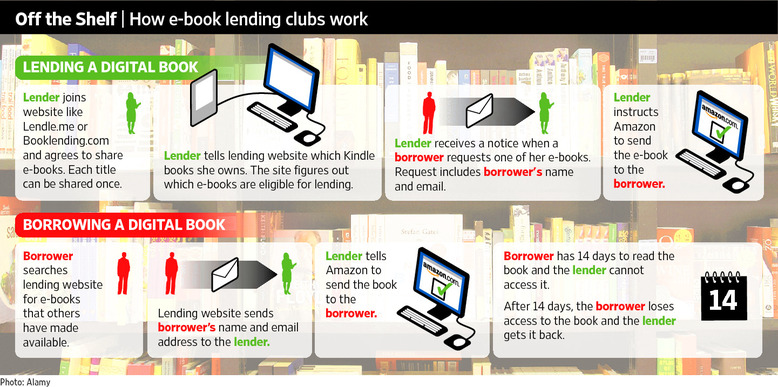In the past few months, online clubs with such names as BookLending.com and Lendle.me have proliferated. The sites, some of which have gathered thousands of users, allow strangers to borrow and lend e-books for
Amazon.com Inc.'s Kindle and
Barnes & Noble Inc.'s Nook free.
The sites are the latest twist in the industry of e-books, which has disrupted the traditional book-publishing industry and changed that business's economics. Public libraries can't lend e-books in the Kindle format, though they can for other e-reading devices.
Previously, Kindle and Nook readers were largely limited to sharing e-books with friends because two users needed to know each other's email address to initiate a loan. The new sites give e-book readers access to a larger network of people and a larger selection of books.
The lending sites have drawbacks. One is limited selection. Most major book publishers haven't made their e-books lendable, and the books can be lent only once and for only 14 days. That means that with every successful loan, the sites' available library shrinks unless new users with books to lend join.
. . .
. . . The sites' creators said they decided to launch the services after Amazon, following Barnes & Noble's lead, introduced the ability to lend Kindle e-books in late December. Analysts estimate that Kindle has about two-thirds of the U.S. market for e-books. . . .
Lending on the different sites is similar. Users request the title they want to borrow. If would-be lenders approve the loan of, for example, a Kindle book, they are directed to an Amazon page to complete the swap. The borrower gets the book for 14 days, after which it disappears from the borrower's library and the lender gets it back.
BookLending and Lendle users can swap only Kindle titles, while eBook Fling will allow Kindle and Nook borrowing.
All three lending sites are free to users. But if books aren't available for borrowing, the sites refer users to Amazon, and they make a commission if users buy a book there.
The three sites offer incentives for users to make their books available for lending. Lendle requires users to make at least one book available for loan before starting to borrow, and the site has an algorithm that improves users' chances of getting a book they want if they lend frequently. BookLending has a similar algorithm, though it has no requirement to make books available for loan first.



